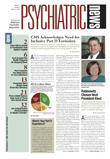Antipsychotic polypharmacy appears to be a common but costly practice whose effectiveness is not supported by evidence, according to two reports in the January issue of Psychiatric Services.
At the state-hospital level, however, the practice can be significantly curtailed if hospital leadership focuses its attention on reviewing prescribing patterns, according to one of those reports.
Researchers at the Neuroscience Education Institute in Carlsbad, Calif., analyzed California Medicaid fee-for-service pharmacy claims from May 1999 through August 2000 for patients who received risperidone, olanzapine, or quetiapine.
Of the 116,114 patients who received at least one of these agents, 4.1 percent received a combination regimen. Polypharmacy was the most expensive form of second-generation antipsychotic use, costing up to three times more per patient than monotherapy, according to Stephen Stahl, M.D., Ph.D., an adjunct professor of psychiatry at the University of California, San Diego, and Meghan Grady, senior medical writer at the Neuroscience Education Institute.
They found that the average amount paid per patient receiving just one antipsychotic medication in the Medi-Cal program (the state's Medicaid program) was $2,382, compared with $7,536 per patient receiving two or more antipsychotic medications for more than 60 days.
“Initially, we talked about polypharmacy, and psychiatrists were well aware of the incidence, but we couldn't make a change despite the education.”
“If antipsychotic polypharmacy were more effective than monotherapy, this practice may actually reduce total costs despite the higher pharmacy costs,” Stahl and Grady said. “However, there are currently no data available to support the effectiveness of antipsychotic polypharmacy. Thus, there is no reason to believe that antipsychotic polypharmacy would reduce total costs.”
A second paper in Psychiatric Services reported the effectiveness of a medication review by hospital administrators who actively focused attention on antipsychotic polypharmacy in an effort at re-education.
Vijayalakshmy Patrick, M.D., a clinical associate professor of psychiatry at the University of Medicine and Dentistry of New Jersey, and colleagues reported on an initiative undertaken by psychiatrists and hospital administrators at an unnamed 570-bed state psychiatric hospital in the northeastern United States aimed at reducing antipsychotic polypharmacy.
Baseline prescribing practices were gathered for 14 psychiatrists at the hospital in May 2001. An initial educational program— including case discussions, consultations with psychiatrists, and psychopharmacology seminars—did not produce a decline in polypharmacy at follow-up in November of that year.
At that point, a new chief of psychiatry met individually with each psychiatrist to compare his or her antipsychotic prescribing data with that of anonymous peers and urged each to reduce polypharmacy prescribing by 10 percent. Psychiatrists were assured that results would not influence performance evaluations, according to the report.
A follow-up review in August 2002 found that 127 patients treated by the 14 psychiatrists were receiving antipsychotic polypharmacy compared with 197 patients in November 2001.
The largest subgroup had been receiving “mixed polypharmacy,” the use of a first-generation agent plus a second-generation agent. That group also decreased significantly, from 165 patients in November 2001 to 106 in August 2002.
Of the 14 psychiatrists, 13 reduced their use of polypharmacy, and eight met the goal of decreasing polypharmacy by at least 10 percent.
“The performance improvement strategy was noteworthy because it did not include sanctions or compromise anonymity, but relied solely on the chief of psychiatry's personal expression of expectations along with provision of individual data for comparison,” the report pointed out.
In an interview with Psychiatric News, Patrick said that monthly medication reviews typically do not address whether polypharmacy is necessary. But she emphasized that the use of multiple medications is not supported by evidence and may take the place of useful nonpharmacologic interventions.
Though outcome data on patients who switched from polypharmacy to monotherapy were not reported, Patrick said there were no adverse effects observed.
She said that because of the chronicity of severe psychiatric illness and frequent medical comorbidity, there are times when polypharmacy is necessary. But she added that in her experience, she had never known a patient to get worse after switching from polypharmacy to monotherapy, especially when other treatment modalities are combined.
Patrick said that the critical factors in the follow-up intervention were the focused attention of leadership and the availability of anonymous comparison data with peers. “Initially, we talked about polypharmacy, and psychiatrists were well aware of the incidence, but we couldn't make a change despite the education,” she said.
Psychiatr Serv 2005 57 21
